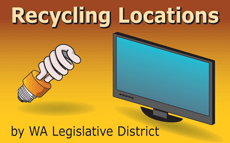EPR for PPP
In the wake of reports from the Seattle-King County Responsible Recycling Task Force and the Product Stewardship Institute (PSI) extolling the benefits of extended producer responsibility (EPR) systems over our current fragmented, local approach, EPR is in the news in 2020.
In Recycling Today, Resa Dimino and Bryce Hesterman of RSS roundup current legislation and activities on packaging EPR in the U.S., including Washington and Oregon, as well as Canada, writing that a "growing chorus is pointing to extended producer responsibility (EPR) legislation for printed paper and packaging (PPP) as a solution... Although we are witnessing some state- and federal-level interest in EPR legislation as a method for sustainably financing PPP recycling, a majority of U.S. communities continue to try to maintain their programs within the current system. Whether EPR is the solution, serious discussions around the U.S. recovery system are taking place, and the time for significant solutions has come."
Waste Dive covered Maine and California EPR legislation and quoted PSI and the National Stewardship Action Council (NSAC), writing that despite "the stalled momentum [due to the pandemic], a number of EPR supporters say they view the current economic disruptions as underscoring the perceived advantages of such a system."
Pacific NW magazine wrote that communities across Washington state have "launched campaigns, with slogans like “Empty, Clean and Dry,” to nudge residents into better habits and stop “wishful recycling”... But there’s a limit to what education can achieve in the absence of policies to create a robust environment for recycling... We don’t want to put the burden on the consumer. We would like to see the responsibility placed on the manufacturers" as is done in British Columbia's RecycleBC EPR system.
Grist wrote that "what has been revealed after [China's] National Sword is that this is not, by any stretch of the imagination, a technology problem. It’s a consumption problem and a manufacturing problem... any attempt to fix plastic recycling should come with constraints on the production of new materials — only manufacturing plastics that can be easily broken down and reused, for example, or mandating that companies include a certain percentage of recycled materials in their products." The federal Break Free from Plastic Pollution Act would phase out many single-use plastic items like utensils and straws and require big companies to pay for recycling and composting products.
The Intercept quoted Senator Tom Udall, who introduced the Break Free From Plastic Pollution Act in February, “By asking for a billion-dollar handout, Big Plastic is trying to maintain what already is the status quo: that is, taxpayers funding and taking responsibility for the waste of plastic producers. When we surface from this pandemic, plastic pollution will still be at crisis levels — and matters may be even worse, as industry tries to exploit this pandemic to leverage more marketing for single-use products.”
"Udall was referring to recent attempts by the plastic industry to use the coronavirus crisis as a justification for rolling back bans on plastic bags and producing more single-use products. In March, the Plastics Industry Association wrote to the secretary of Health and Human Services, Alex Azar, asking him to “make a public statement on the health and safety benefits seen in single-use plastics.” The group also supplied its member companies with form letters requesting that their businesses that make single-use plastics, including packaging, be deemed essential."
More on plastics in the time of COVID-19:
- In our opinion undoing plastic bans is risky business - Resource Recycling
- The collateral damage in plastic wars - Resource Recycling
- Maintain your sustainable packaging focus - Packaging Digest
- The plastics industry is trying to cash in on the COVID-19 pandemic - Gizmodo
- Correcting misinformation on Connecticut's Bottle Bill during the COVID-19 pandemic - CT Mirror
